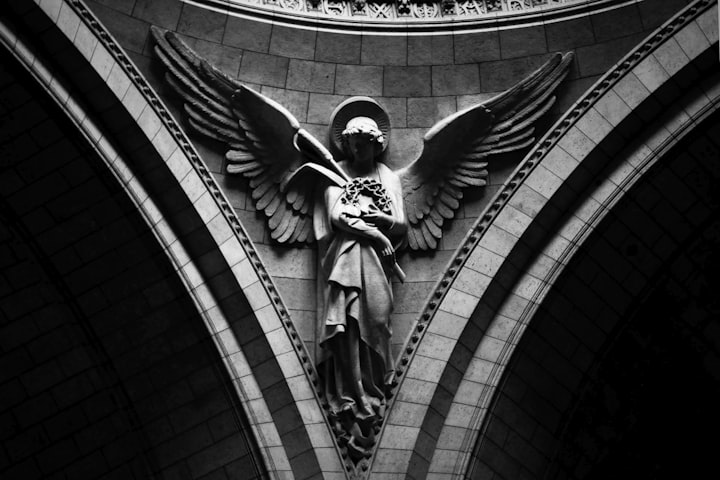Good Omens and Queerbaiting
Or, the complete lack thereof

When the TV Mini-series adaptation of Good Omens (written by Neil Gaiman and the late Sir Terry Pratchett) came out, it was fairly easy to predict the main controversy.
After all, fans had been shipping Crowley and Aziraphale in art and fanfiction, in various levels of graphicness, for roughly two decades. Michael Sheen, the actor who plays Aziraphale, was open about acting as though he were one half of the world's longest slow-burn romance. Neil Gaiman encouraged fans to interpret the text however most inspired them.
Fans, especially LGBTQ+ fans who longed for representation that wasn't a stereotype, and finally had source material by authors known for non cis-het characters and writing them well, were thrilled. Everyone was eagerly speculating about seeing Crowley and Aziraphale finally get together as a couple, as was hinted at in the Good Omens (book) epilogue, where they buy a cottage in South Downs and move in together. David Tennant and Michael Sheen had such chemistry in the teasers; surely this was finally happening!

The friendship and affection that Aziraphale and Crowley have for each other clearly shines through whenever they're on-screen together. Even when they're in a solo scene, there's a quiet consideration for the other that seeps through. Crowley makes a point of rescuing Aziraphale's books during a WWII air raid, and the music subtly swells in a romantic theme, as the camera zooms in on Aziraphale's tiny smile and soft expression.
Aziraphale, who can't lie to save his life, diverts attention from the lingering traces of Crowley's demonic presence by blatantly misleading his superiors. Crowley really needs that Holy Water, but Aziraphale said no, upset at what he saw as Crowley wanting a "suicide pill", so Crowley respects that and hires a team of misfit criminals to break into a church. Even then, with Aziraphale toeing the line of treason against Heaven more than he's ever dared before, the Angel's main concern is for how dangerous it is for Crowley to be anywhere near Holy Water. Even a single drop could destroy him, body, soul and very essence.
(Aziraphale later relents when it becomes clear that Crowley is serious, giving Crowley a flask with the following dialogue.
Crowley: "It's the real thing?"
Aziraphale: "The holiest."
This implies that not only is Aziraphale entrusting Crowley with the most powerful weapon against other demons, he's also trusting that Crowley won't misuse it, and the direct implication that he blessed the water himself, rather than trusting the job to a mortal priest.)
However, at no point in time do they kiss, or declare undying love, and the epilogue was cut for the sake of running time.
Fans were disappointed, but largely satisfied by the portrayal.

Of course, there's a certain sub-section of the internet that is never happy unless an adaptation is all their headcanons brought to life, and they quickly went on the attack.
There were claims that Gaiman was homophobic because he refused to confirm the characters as Gay, citing text that clarifies that Angels and Demons have no gender unless they really want to to put in the effort. (Casting for the miniseries supports this, with Archangels Michael and Uriel, and Demons Beelzebub and Dagon played by female actors, no explanation needed or given. Michael and Beelzebub in particular are deliberately androgynous in appearance and clothing.) Crowley presents as a women, both at the Crucifiction and as Nanny Ashtoreth, and doubtless at other points throughout history, often enough enough that he's easy to see as genderfluid.
There were countless Tumblr asks consisting of "LET THEM KISS, YOU COWARDS!". Entire essays were written about how Good Omens was secretly homophobic, or pandering to conservative audiences in pursuit of the Almighty Dollar. Claims of queer-baiting by yet another studio claiming to be progressive but chickening out of actually following through. (*cough*Disney*cough*)
Honestly, just reading it was exhausting.

"Queer-baiting", for those unaware, is a term for when a studio, media, or promotional material tease and hint at a non-straight relationship, but refuse to actually follow through or even confirm the characters as LGBTQ+.
Good Omens is none of those things.
When Crowley and Aziraphale temporarily part ways in the face of the Apocalypse, it's explicitly framed as a bad breakup, to the point where a bystander comforts Aziraphale, saying "I've been there; you're better off without him."
It' s not a Gay Romance because Aziraphale and Crowley are technically genderless, and because having been forced to hide their feelings for 6000 years, they're only just now feeling their way toward a romance.

I saw it as none of those things.
Rather, watching the mini-series for the first (and fifth, and ninth, and umpteenth) time, I saw the stirrings of an Asexual relationship, filled with every ridiculous trope I love in Romance. Slow-burn, enemies-to-friends-to-lovers, star-crossed partners yearning for each other, and pure-of-heart but dumb-of-ass.
For millennia, they didn't dare quantify what they were to each other, even as they drew ever closer. For centuries more, even acknowledging that they were friends seems like more than they ever dreamed to dare.
They know what they are to each other, of course. Aziraphale's threat to never speak to him again yanks Crowley out of terror-induced paralysis, and Aziraphale's denial of friendship in a moment of high stress and anxiety doesn't fool him for a second. They do little things for each other without even thinking about it, affection and fond exasperation in equal measure. Aziraphale picks at Crowley's driving, while Crowley deplores Aziraphale's fashion sense, but no one else may ever speak badly of them in the other's hearing.
It isn't until they face the idea of the other Not Being There that they dip from 'undefined' to 'love', a few hours before they finally have the freedom to explore what form they want that love to take.

Media, whether book or movie or TV show, doesn't have to show two characters actively getting it on in order to show that they're in love. Body language, expressions and interactions, dialogue, background music and soundtrack, even complimentary costuming… all of those things tell a story, too.
Relying on a sex-scene to prove that two characters like each other… That's just bad storytelling and lazy screenwriting, and if there is one thing that Neil Gaiman (and Terry Pratchett) is not, it's lazy or low-rate storytellers.

If you liked this story, leave a heart or a tip, and follow me on Vocal and Medium!
About the Creator
Natasja Rose
I've been writing since I learned how, but those have been lost and will never see daylight (I hope).
I'm an Indie Author, with 30+ books published.
I live in Sydney, Australia






Comments
There are no comments for this story
Be the first to respond and start the conversation.